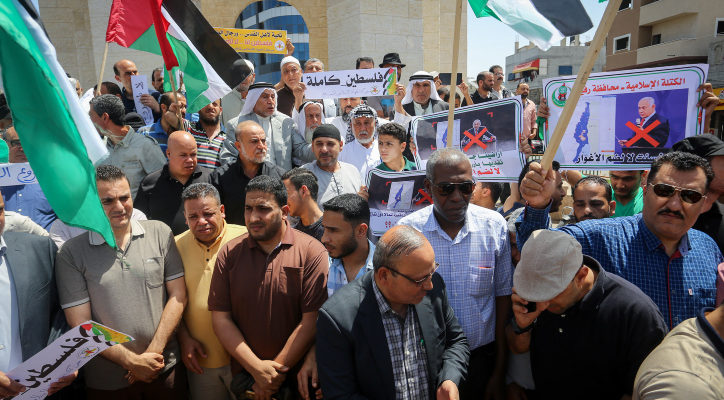Palestinian observers say the Arab states aren’t in a position to take concrete action against the Trump plan.
By Lauren Marcus, World Israel News
As the July 1 date for annexation set by Prime Minister Benjamin Netanyahu approaches, Arab countries have spoken out publicly against the plan, which would see Israel declaring sovereignty over parts of Judea and Samaria and the Jordan Valley.
Egyptian Foreign Ministry spokesman Ahmed Hafez sent words of encouragement to Ramallah, passing along an official statement from Foreign Minister Sameh Shoukry, saying, “Egypt rejects all unilateral breaches of international law and warns of the dangerous consequences of annexing West Bank land.”
UAE Ambassador to the United States Yusef Al Otaiba penned a Hebrew language op-ed published in Israeli newspaper Yediot Ahronot, warning that annexation would require the UAE and other Gulf states to take a step back from normalization, after years of slowly warming ties with Israel.
But despite the public statements of support, many Palestinian commentators remain skeptical about said support materializing into concrete action.
“The attitudes of Arab states toward annexation will be no different from their position on the Palestinian issue: political statements without any real action in the field,” said Ayman Yusuf, a professor of political science and international relations at the Arab American University of Jenin.
Speaking to the Turkish News Agency, Yusuf said, “Arab states are facing internal difficulties as a result of the Arab Spring and the coronavirus pandemic. Their situations do not allow them to take steps regarding the Palestinian issue.”
Touching on the Hamas-Fatah political rivalry within the Palestinian territories, he said, “The Palestinian split has contributed to the advancement of Israel’s normalization among Arab states, because of the understanding that the Palestinians cannot govern themselves.”
“Arab states are fragmented and suffer from internal strife and sectarian divisions,” said political commentator Hani al-Masri to Makor Rishon. “Every step to support the Palestinian issue will be weak and ineffective.”
Palestinian journalist Muhammad Khawash told Makor Rishon that he believed the Arab states would like to intervene on behalf of the Palestinians, but are unable to act due to American pressure.
“They cannot make significant political decisions because of their relationship with the United States,” he said. “Every Arab country needs to be careful not to hurt its interests in Washington by actions against Israeli annexation.”
Last week, Palestinian Prime Minister Mohammed Shtayyeh submitted a counter-proposal to the Trump peace plan to the Quartet, a group brought together by the Bush administration in 2002 to negotiate a Mideast settlement. It’s made up of the U.S., UN, EU and Russia.
Shtayyeh said the proposal calls for an “independent and demilitarized Palestinian state, with minor modifications of borders where necessary.”
He added that if annexation moves forward, he will ask for international recognition of a Palestinian state based on the 1967 borders with a capital in eastern Jerusalem.





